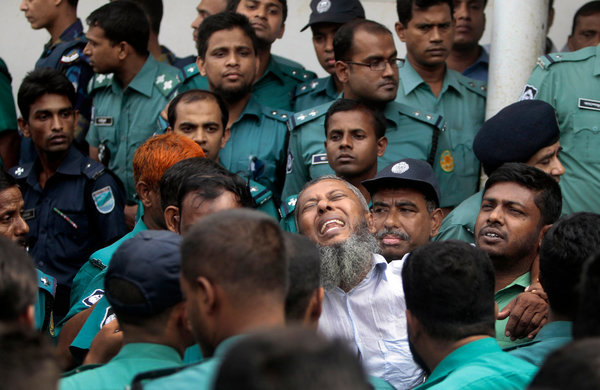
A member of the Bangladesh Rifles who was sentenced to death by a Dhaka judge in connection with a bloody 2009 mutiny.
DHAKA, Bangladesh — One hundred and fifty-two former members of the Bangladesh Rifles, a paramilitary border security unit, were sentenced to death on Tuesday by a Dhaka judge in connection with a bloody 2009 mutiny in which several thousand troops took control of their headquarters, demanding better working conditions, and killed scores of people.
The mutiny began suddenly, at an annual conference of the border force, as a number of guards took their commanders, officers of the Bangladesh Army, hostage. As soldiers massed around the building, the border guards announced a list of demands, among them better pay, permission to participate in United Nations peacekeeping missions, and changes in the force’s command and control structure.
The mutiny collapsed 33 hours later, after army tanks surrounded the border guards’ headquarters in the heart of this crowded capital. As the uprising ended, many border guards reportedly shed their uniforms and fled the site, while security forces combed the area for fugitives.
Police officers entering the building found a mass grave containing the bodies of officers in combat fatigues who had been seized as hostages. Seventy-four people were killed in the uprising, including 57 top-ranking and midranking army officers.
The mutiny posed a stark test for the country’s leadership, elected after two years of army-backed emergency rule.
Prosecutors originally brought charges against 850 men serving in the Bangladesh Rifles but 277 were acquitted at a mass trial. Of those convicted, 256 were given sentences of 20 years or less and 161 were sentenced to life in prison. Four of the accused died during the course of the trial.
Rights advocates said they could not recall a time when so many defendants were sentenced to the death penalty in one single court proceeding. They were particularly struck by both the severity and the scope of the punishment in a country that has an established legal system and is not in a state of war.
“It’s possible that there’s some civil war situation where this might have happened but there’s nobody who’s thought of it,” said Brad Adams, the executive director of Human Rights Watch’s Asia division. “We can’t think of anything like it.”
Bangladesh has been one of the lowest users of the death penalty in countries that still have capital punishment, according to Amnesty International. If all the defendants sentenced to death on Tuesday are executed, Bangladesh would rocket to third place in Amnesty’s annual ranking of death penalty countries, surpassing Iraq, but still below Iran and China.
@rrajowan / Source : New York Times



































